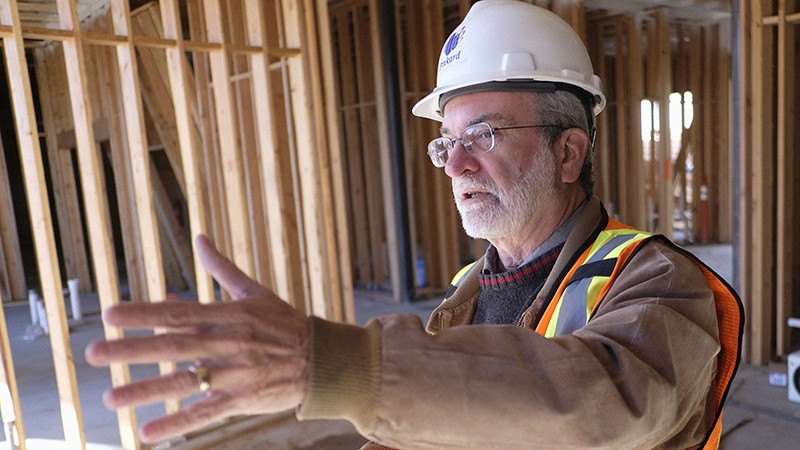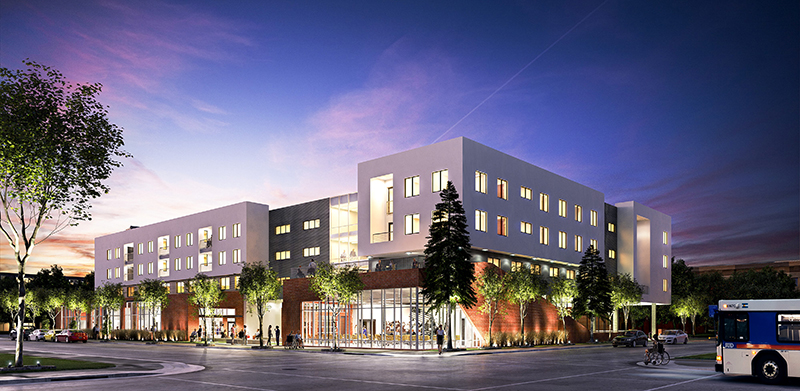
Pat Coyle, executive director of the Atlantis Community Foundation, gives a tour of Atlantis’s new housing units being built in Denver for people with disabilities. Photo by Joe Mahoney / Special to The Colorado Trust
Pat Coyle, executive director of the Atlantis Community Foundation, gives a tour of Atlantis’s new housing units being built in Denver for people with disabilities. Photo by Joe Mahoney / Special to The Colorado Trust
Forty-five years ago, Atlantis Community launched one of the most powerful disability rights movements in the world by demanding independent living for young Coloradans living with disabilities who were trapped in the depressing and neglectful nursing homes of the 1970s.
For all their success bringing equity to people living with disabilities—in housing, public transit, building accessibility and worker rights—Atlantis and the cohort of service and advocacy agencies across the state remain frustrated by a stubborn figure: Less than 1% of Colorado housing stock is accessible to people with disabilities.
If no one else is doing it right, then do it yourself. Atlantis is now extending that accept-nothing-less philosophy to housing construction, currently topping off the fourth story of its first built-from-scratch residential community on the site of its longtime headquarters at Cherokee Street and Cedar Avenue in central Denver.
The first phase of the effort creates 60 accessible and affordable units, with 25% set aside for extremely low-income residents with disabilities, and the other 75% for individuals or small families with incomes at 30% to 60% of area median income. Atlantis estimates that at 30% to 60%, annual incomes would be about $16,800 to $33,600 for single households, and up to $43,260 for a family of three.
The second phase of the $20 million project will begin as soon as residents and the Atlantis offices are moved into the new building. In Phase 2, the current Atlantis offices and warehouse will be knocked down and 60 more living units will go up by 2021.
Beyond the units themselves, the location provides access to the kinds of comprehensive services most developers can’t or won’t plan for: Office and community space within the building; proximity to nearby Bayaud Enterprises that provides training and jobs for many people living with disabilities; and easy access to the RTD rail and bus hub at Cherokee and Alameda.
Atlantis is once again at the forefront of solving problems for people with disabilities using new techniques, said Adam Ballard, housing and transportation policy analyst with Access Living in Chicago, a service and advocacy nonprofit that also monitors national trends.
While less than 1% of the housing stock across the nation is accessible, Ballard said, “up to 20% of Americans have some kind of mobility impairment that will require some kind of access feature in their home. So that’s why we have the [accessible-housing stock] crisis we do.”
“It’s all over the world,” Ballard said of the accessible housing deficit. “The consciousness of people with disabilities in our community is still so new that our built environment has not caught up.”
Julie Reiskin, executive director of the Colorado Cross-Disability Coalition (a Colorado Trust grantee) and a board member of Atlantis Community when talk of the development first began, said the need is dire and the location is perfect.
“The housing crisis has hit our community very hard, and this was something we could do,” Reiskin said. “We understand this is a drop in the bucket, but we’ll continue to work on this.”
Any addition to the accessible housing market in Colorado is welcome and overdue, said Regan Linton, artistic director of Phamaly Theatre Company and a wheelchair user who moved back in with family after finding independent housing stock to be overpriced or ill-configured.
“It’s definitely necessary in Denver—I’ve had people reach out to me who are leaving Craig [rehabilitation hospital] after an injury, and it’s like, good luck going down a rabbit hole looking for housing,” Linton said. People with injuries or disabilities always seem to be scrambling on cost or access, she said.
“Lots of people find something that’s not accessible and jimmy something to make it work or invest a lot of their own money. They deserve more.”
Atlantis Community Foundation, the sister organization to the advocacy group, currently manages 100 apartment units spread among six properties it has acquired over time. Building from scratch—a rarity among disability service agencies, according to Ballard—grew to be an option when foundation leaders saw Denver’s accessible and affordable housing stock stagnating.
Federal law requires housing developers to make only 2% of their new units accessible to those living with disability, said foundation executive director Pat Coyle. “In a 100-unit project, that’s two units—not a whole lot,” he said. “Production is ill-served by that threshold.”
The other major impetus, Coyle said, was the Atlantis founding principle of living independently with the support of a like-minded community. That can mean everything from electronic entry doors with no handles, to wheel-in showers, to community space for a weight rack used by residents trying to avoid muscle atrophy.
“The Cliff Notes version is they want to live like everybody else,” Coyle said. “Today’s technology and today’s design features allow that.”
Other features of the Phase 1 building include:

Courtesy of Atlantis Community Foundation
Local and national studies alike have laid out challenges for accessible housing. The Colorado Health Institute’s “Home Equity: A Vision of Housing Security, Health & Affordability” report published in 2019 noted that “of the 11 percent of Coloradans with a disability, 35 percent live in households that are cost burdened [spending more than 30 percent of take-home income on housing] and 18 percent are severely cost burdened. Coloradans without disabilities are much less likely to be cost burdened (27 percent) or severely cost burdened (10 percent).” Additionally, the report noted that “19 percent of homes in which someone with a disability lives had signs of mice or rats in past year, compared with 11 percent of other households.”
Bias against disabled citizens is another major barrier, as noted in an Urban Institute study for the U.S. Department of Housing and Urban Development in 2015. Researchers conducted field tests of housing inquiries by wheelchair users and the hard of hearing. The deaf or hard-of-hearing homeseekers got fewer responses to their inquiries than hearing customers, and when they did get responses, they were told of fewer available housing options. Customers using wheelchairs were denied appointments, shown fewer options, and were given confusing explanations or outright denials of adaptive modifications, the study found.
When Phamaly Theatre Company officials were looking for new office space recently, they found a spot with accessible interior space. But then the parking areas weren’t covered, which becomes a deal-breaker in the kind of one-foot snowstorm Denver got just after Thanksgiving.
“That’s not a big deal for other people, but for me trying to clean off my car, or not having the sidewalks cleared… . We all face similar challenges, but it has a deeper and significant impact when you have unique needs,” Linton said.
To allow such affordable housing complexes to survive on reasonable rents from lower-income residents, groups like Atlantis Community Foundation are taking advantage of a federal affordable tax credit program. The nonprofit sells millions of dollars in tax credits to investors who can legally profit from them, building the bulk of an apartment complex without debt. Atlantis adds in some of its own funding and grants from foundations and from the City and County of Denver’s affordable housing program.
In other examples of creative financing for affordable, alternative housing, the Second Chance Center, which provides opportunities for Coloradans leaving the justice system, is using $10 million in federal tax credits to build affordable, supported housing units in Aurora. A percentage will be set aside for former prisoners, some of whom may struggle to avoid recidivism. Elsewhere, Denver recently selected Brothers Redevelopment to build and manage 72 units of housing on East Colfax Avenue specifically for people living with brain injuries who have incomes below 30% of area median income, or about $19,500.
Atlantis Community Foundation’s second phase at Cherokee and Cedar will use more traditional financing, taking advantage of money received from for-profit developers for a next-door lot that became SoBo Station apartments. Atlantis owns other properties as well, from a time when Baker and South Broadway were struggling neighborhoods; Coyle wants the organization to continue seeking creative financing and partnerships for more housing.
The Atlantis principle holds that independent living is both better for the client and a money-saver for government. The same idea applies across many categories, Atlantis and other nonprofit developers like Second Chance said. The original push in the 1970s was to leave expensive and degrading nursing homes. Similarly, supporting former prisoners in community housing is cheaper than operating prisons, research has found. Additionally, long-term rehabilitation hospitals for traumatic brain injuries, as another example, are some of the most expensive institutions going.
“If you’re able to house someone independently, you’re really saving the public a lot of money,” Coyle said. “We’re not kidding ourselves, there are needs for group homes and nursing homes—but it is a fact that a number of people in those facilities could be living more independent lives, and that’s the history of Atlantis.”
Atlantis appears to have put careful thought into the building blocks of integration for the new development, said Chicago’s Ballard. There has long been tension within communities of residents with disabilities whether to segregate, and run things their way, or integrate and assumedly benefit from interacting with wider society. Access Living fought to open up Section 811 federal housing benefits that tended to segregate disability housing, and now those projects allow no more than 25% of units to be set aside for residents with disabilities.
“I think that’s kind of the sweet spot,” Ballard said of this ratio. “My personal preference would be to live in fully integrated housing but have enough people around like me to have some mutual support. Sometimes, independence also means interdependence; at the end of the day, we want choice for people.”
New money for subsidized housing has dried up to the point where available units in Colorado are frequently in segregated disability or elderly communities, Reiskin said. Successful projects integrating accessible housing don’t try to limit leases to one kind of person, or force a menu of supportive services on all residents, she said: “We’re not assuming everyone needs support, or needs it from one place.”
The Baker neighborhood, meanwhile, which has long been accustomed to Atlantis services and members in their midst, have been “very welcoming” to the project, Reiskin said. At this point, with construction on schedule, the hardest job will be for those sorting out a rush of applications for thespace.
“I could fill it up today just with people I know—ask any disability advocate and they’ll tell you the same thing,” Reiskin said. “I feel so sorry for whoever has to make the choices.”